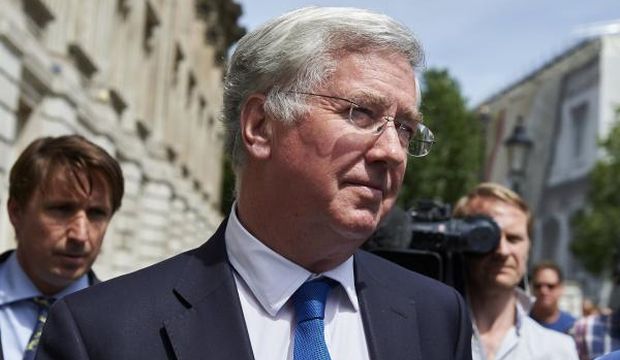
British Defense Secretary Michael Fallon (C) leaves the Cabinet Office in central London, on June 29, 2015, after attending a security meeting on the mass shooting in Tunisia that killed at least 38 people including many British tourists. (AFP Photo/Niklas Halle’n)
London, Reuters—Britain is considering whether it could and should do more to help defeat Islamic State of Iraq and Syria (ISIS) militants in Syria after a deadly attack in Tunisia last week killed up to 30 of its nationals, a spokeswoman for Prime Minister David Cameron said on Wednesday.
As part of a US-led coalition against ISIS, Britain conducts regular airstrikes in neighboring Iraq and flies drones over Syria to gather intelligence on the militant group.
But unlike some other coalition partners it does not carry out strikes against ISIS in Syria after Cameron lost a 2013 parliamentary vote on the issue.
Cameron had sought approval to strike Syrian government forces to punish them for what he said was an appalling chemical weapons attack, but was unexpectedly voted down.
On Wednesday, in light of last week’s attack in Tunisia, Cameron’s spokeswoman said his government was taking another look at its overall strategy in the region.
“A lot has happened since the chemical weapons attack,” said the spokeswoman, citing the Tunisia killings and the gunman’s possible links to ISIS.
“Therefore the prime minister is clear that we should absolutely be thinking about: ‘Are we doing enough and in the right areas to tackle ISIL?'” she said, using another acronym for ISIS.
Alongside efforts to tackle radicalization and to improve governance in the region, she said the government was considering whether it could do more “on the ground in Iraq and supporting, with our partners, in Syria.”
Cameron has repeatedly said he would seek parliament’s approval to conduct any airstrikes inside Syria.
Earlier on Wednesday, Defense Secretary Michael Fallon urged lawmakers to reconsider the issue of airstrikes in Syria, following Britain’s May general election.
“It is a new parliament and I think members of parliament will want to think very carefully about how we best deal with ISIL and the illogicality of ISIL not respecting the borderlines,” Fallon told BBC radio.
“They don’t differentiate between Syria and Iraq, they are establishing this evil caliphate across both countries.”
